Health Inequality: A Reflective Essay Using Gibbs Model in Healthcare
VerifiedAdded on 2023/06/10
|10
|3412
|385
Essay
AI Summary
This reflective essay examines the pervasive issue of health inequality through the lens of the Gibbs Reflective Model. The essay delves into the multifaceted dimensions of health disparities across various social and economic groups, geographical locations, and ethnicities. It explores the impact of factors such as income, education, and access to healthcare resources on health outcomes. The author reflects on personal experiences and observations, particularly within a professional context, highlighting instances of discrimination and unequal access to care. The essay analyzes the role of governmental policies, communication barriers, and cultural differences in perpetuating health inequalities. Using the Gibbs model, the author describes the situation, their feelings, evaluates good and bad practices, analyzes the situation, draws conclusions, and outlines a plan of action for improvement. The essay underscores the importance of addressing systemic injustices and advocating for equitable healthcare access for all, emphasizing the need for policy changes, improved communication, and cultural sensitivity within healthcare systems. The author also shares experiences related to racial discrimination in healthcare, and discusses the need for healthcare professionals to understand cultural variations and attitudes to ensure equitable healthcare services.
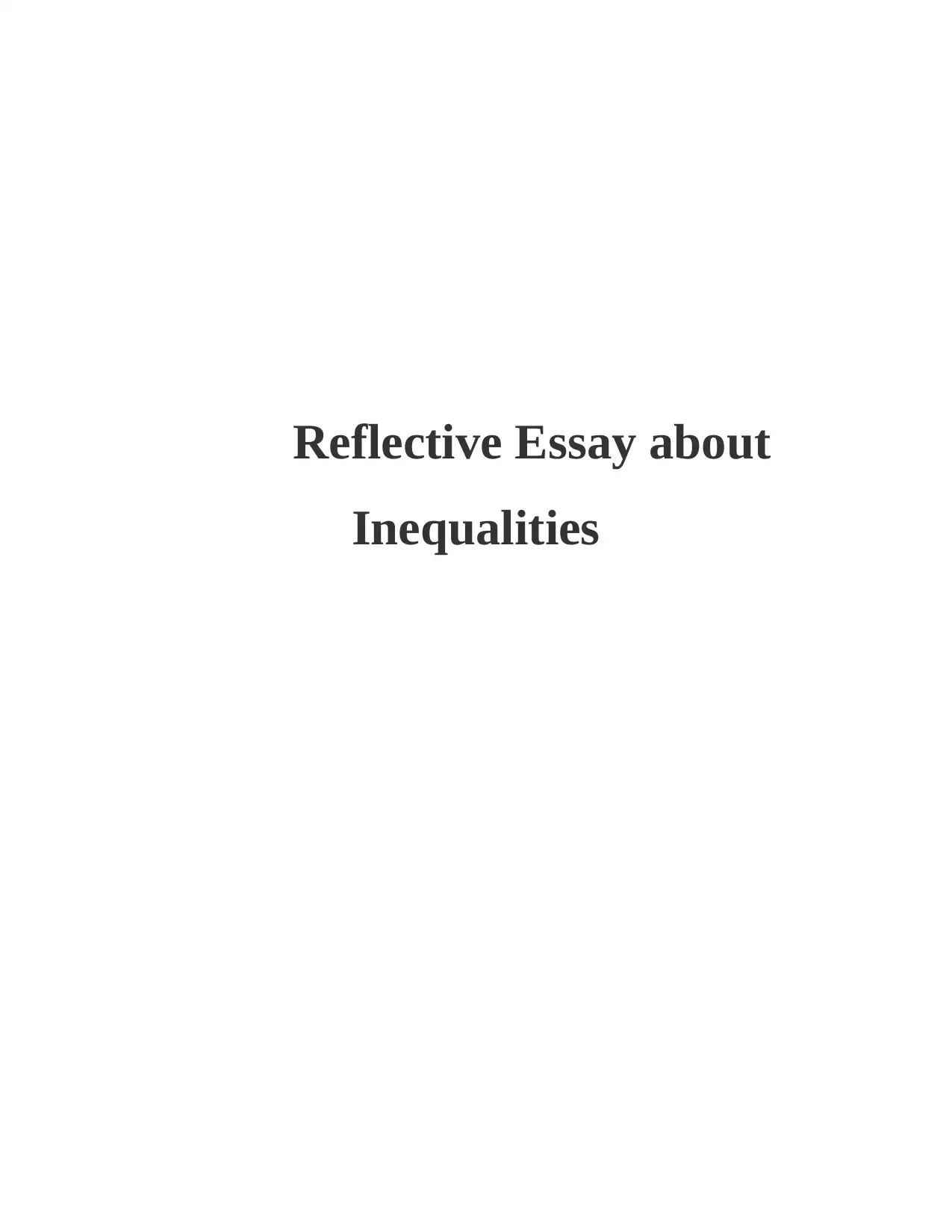
Reflective Essay about
Inequalities
Inequalities
Paraphrase This Document
Need a fresh take? Get an instant paraphrase of this document with our AI Paraphraser
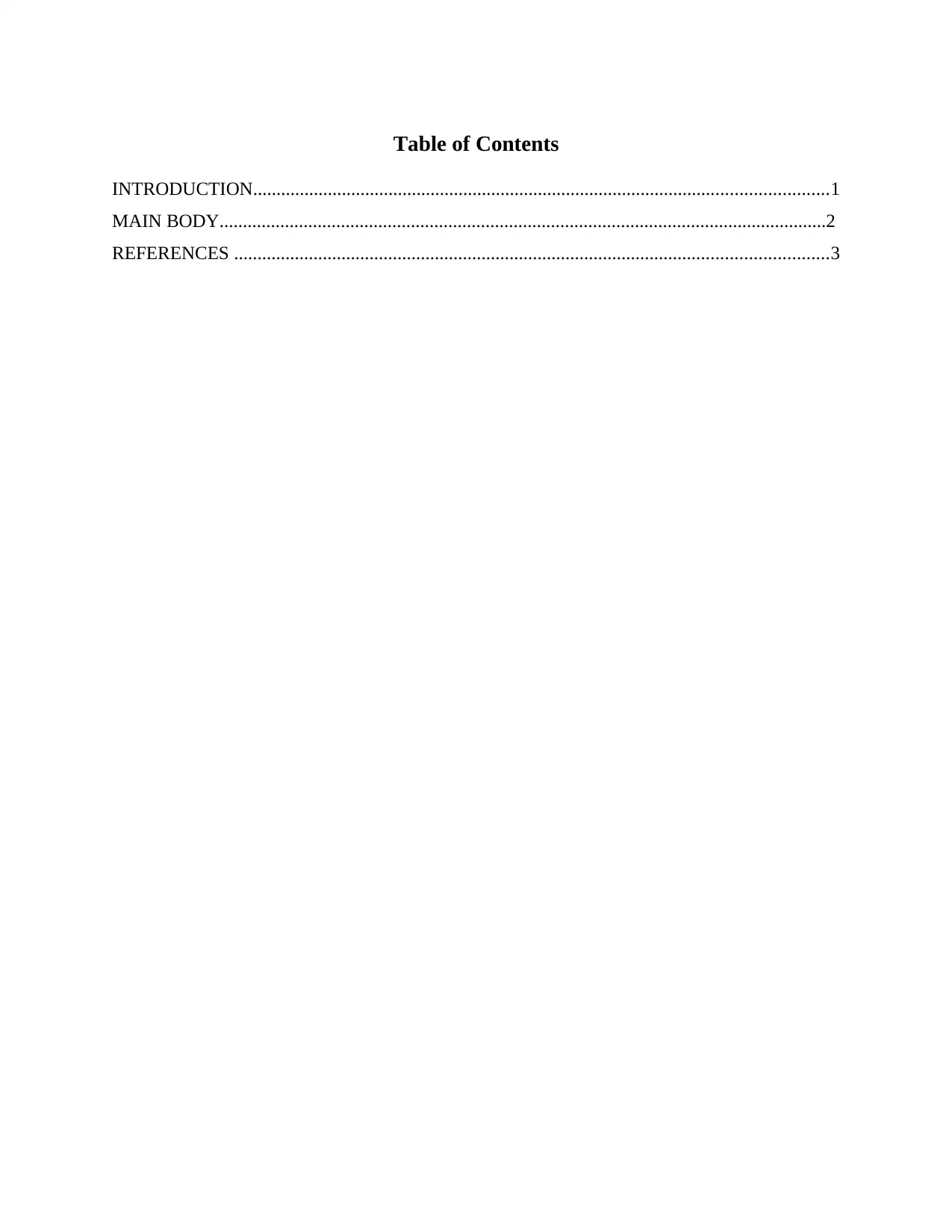
Table of Contents
INTRODUCTION...........................................................................................................................1
MAIN BODY..................................................................................................................................2
REFERENCES ...............................................................................................................................3
INTRODUCTION...........................................................................................................................1
MAIN BODY..................................................................................................................................2
REFERENCES ...............................................................................................................................3
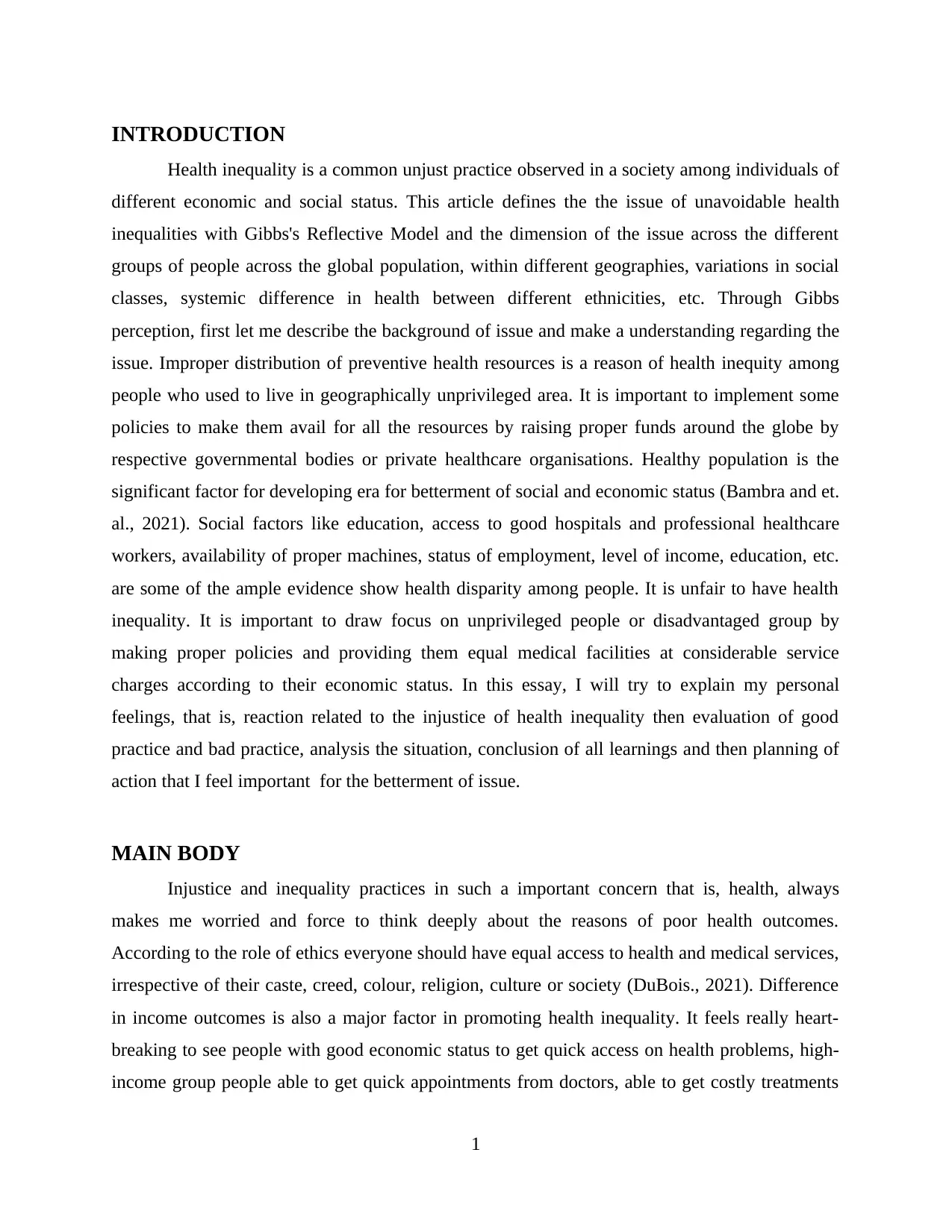
INTRODUCTION
Health inequality is a common unjust practice observed in a society among individuals of
different economic and social status. This article defines the the issue of unavoidable health
inequalities with Gibbs's Reflective Model and the dimension of the issue across the different
groups of people across the global population, within different geographies, variations in social
classes, systemic difference in health between different ethnicities, etc. Through Gibbs
perception, first let me describe the background of issue and make a understanding regarding the
issue. Improper distribution of preventive health resources is a reason of health inequity among
people who used to live in geographically unprivileged area. It is important to implement some
policies to make them avail for all the resources by raising proper funds around the globe by
respective governmental bodies or private healthcare organisations. Healthy population is the
significant factor for developing era for betterment of social and economic status (Bambra and et.
al., 2021). Social factors like education, access to good hospitals and professional healthcare
workers, availability of proper machines, status of employment, level of income, education, etc.
are some of the ample evidence show health disparity among people. It is unfair to have health
inequality. It is important to draw focus on unprivileged people or disadvantaged group by
making proper policies and providing them equal medical facilities at considerable service
charges according to their economic status. In this essay, I will try to explain my personal
feelings, that is, reaction related to the injustice of health inequality then evaluation of good
practice and bad practice, analysis the situation, conclusion of all learnings and then planning of
action that I feel important for the betterment of issue.
MAIN BODY
Injustice and inequality practices in such a important concern that is, health, always
makes me worried and force to think deeply about the reasons of poor health outcomes.
According to the role of ethics everyone should have equal access to health and medical services,
irrespective of their caste, creed, colour, religion, culture or society (DuBois., 2021). Difference
in income outcomes is also a major factor in promoting health inequality. It feels really heart-
breaking to see people with good economic status to get quick access on health problems, high-
income group people able to get quick appointments from doctors, able to get costly treatments
1
Health inequality is a common unjust practice observed in a society among individuals of
different economic and social status. This article defines the the issue of unavoidable health
inequalities with Gibbs's Reflective Model and the dimension of the issue across the different
groups of people across the global population, within different geographies, variations in social
classes, systemic difference in health between different ethnicities, etc. Through Gibbs
perception, first let me describe the background of issue and make a understanding regarding the
issue. Improper distribution of preventive health resources is a reason of health inequity among
people who used to live in geographically unprivileged area. It is important to implement some
policies to make them avail for all the resources by raising proper funds around the globe by
respective governmental bodies or private healthcare organisations. Healthy population is the
significant factor for developing era for betterment of social and economic status (Bambra and et.
al., 2021). Social factors like education, access to good hospitals and professional healthcare
workers, availability of proper machines, status of employment, level of income, education, etc.
are some of the ample evidence show health disparity among people. It is unfair to have health
inequality. It is important to draw focus on unprivileged people or disadvantaged group by
making proper policies and providing them equal medical facilities at considerable service
charges according to their economic status. In this essay, I will try to explain my personal
feelings, that is, reaction related to the injustice of health inequality then evaluation of good
practice and bad practice, analysis the situation, conclusion of all learnings and then planning of
action that I feel important for the betterment of issue.
MAIN BODY
Injustice and inequality practices in such a important concern that is, health, always
makes me worried and force to think deeply about the reasons of poor health outcomes.
According to the role of ethics everyone should have equal access to health and medical services,
irrespective of their caste, creed, colour, religion, culture or society (DuBois., 2021). Difference
in income outcomes is also a major factor in promoting health inequality. It feels really heart-
breaking to see people with good economic status to get quick access on health problems, high-
income group people able to get quick appointments from doctors, able to get costly treatments
1
⊘ This is a preview!⊘
Do you want full access?
Subscribe today to unlock all pages.

Trusted by 1+ million students worldwide
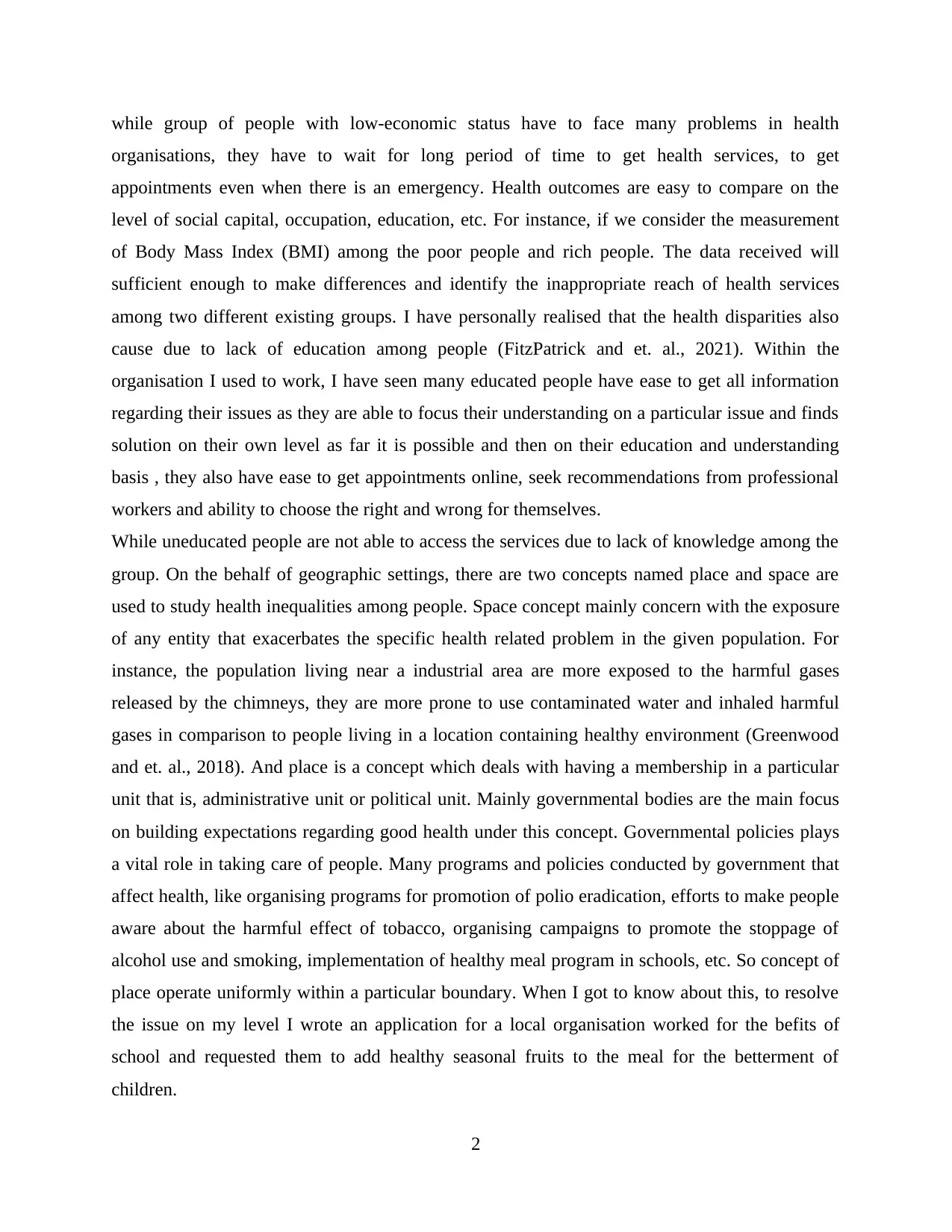
while group of people with low-economic status have to face many problems in health
organisations, they have to wait for long period of time to get health services, to get
appointments even when there is an emergency. Health outcomes are easy to compare on the
level of social capital, occupation, education, etc. For instance, if we consider the measurement
of Body Mass Index (BMI) among the poor people and rich people. The data received will
sufficient enough to make differences and identify the inappropriate reach of health services
among two different existing groups. I have personally realised that the health disparities also
cause due to lack of education among people (FitzPatrick and et. al., 2021). Within the
organisation I used to work, I have seen many educated people have ease to get all information
regarding their issues as they are able to focus their understanding on a particular issue and finds
solution on their own level as far it is possible and then on their education and understanding
basis , they also have ease to get appointments online, seek recommendations from professional
workers and ability to choose the right and wrong for themselves.
While uneducated people are not able to access the services due to lack of knowledge among the
group. On the behalf of geographic settings, there are two concepts named place and space are
used to study health inequalities among people. Space concept mainly concern with the exposure
of any entity that exacerbates the specific health related problem in the given population. For
instance, the population living near a industrial area are more exposed to the harmful gases
released by the chimneys, they are more prone to use contaminated water and inhaled harmful
gases in comparison to people living in a location containing healthy environment (Greenwood
and et. al., 2018). And place is a concept which deals with having a membership in a particular
unit that is, administrative unit or political unit. Mainly governmental bodies are the main focus
on building expectations regarding good health under this concept. Governmental policies plays
a vital role in taking care of people. Many programs and policies conducted by government that
affect health, like organising programs for promotion of polio eradication, efforts to make people
aware about the harmful effect of tobacco, organising campaigns to promote the stoppage of
alcohol use and smoking, implementation of healthy meal program in schools, etc. So concept of
place operate uniformly within a particular boundary. When I got to know about this, to resolve
the issue on my level I wrote an application for a local organisation worked for the befits of
school and requested them to add healthy seasonal fruits to the meal for the betterment of
children.
2
organisations, they have to wait for long period of time to get health services, to get
appointments even when there is an emergency. Health outcomes are easy to compare on the
level of social capital, occupation, education, etc. For instance, if we consider the measurement
of Body Mass Index (BMI) among the poor people and rich people. The data received will
sufficient enough to make differences and identify the inappropriate reach of health services
among two different existing groups. I have personally realised that the health disparities also
cause due to lack of education among people (FitzPatrick and et. al., 2021). Within the
organisation I used to work, I have seen many educated people have ease to get all information
regarding their issues as they are able to focus their understanding on a particular issue and finds
solution on their own level as far it is possible and then on their education and understanding
basis , they also have ease to get appointments online, seek recommendations from professional
workers and ability to choose the right and wrong for themselves.
While uneducated people are not able to access the services due to lack of knowledge among the
group. On the behalf of geographic settings, there are two concepts named place and space are
used to study health inequalities among people. Space concept mainly concern with the exposure
of any entity that exacerbates the specific health related problem in the given population. For
instance, the population living near a industrial area are more exposed to the harmful gases
released by the chimneys, they are more prone to use contaminated water and inhaled harmful
gases in comparison to people living in a location containing healthy environment (Greenwood
and et. al., 2018). And place is a concept which deals with having a membership in a particular
unit that is, administrative unit or political unit. Mainly governmental bodies are the main focus
on building expectations regarding good health under this concept. Governmental policies plays
a vital role in taking care of people. Many programs and policies conducted by government that
affect health, like organising programs for promotion of polio eradication, efforts to make people
aware about the harmful effect of tobacco, organising campaigns to promote the stoppage of
alcohol use and smoking, implementation of healthy meal program in schools, etc. So concept of
place operate uniformly within a particular boundary. When I got to know about this, to resolve
the issue on my level I wrote an application for a local organisation worked for the befits of
school and requested them to add healthy seasonal fruits to the meal for the betterment of
children.
2
Paraphrase This Document
Need a fresh take? Get an instant paraphrase of this document with our AI Paraphraser
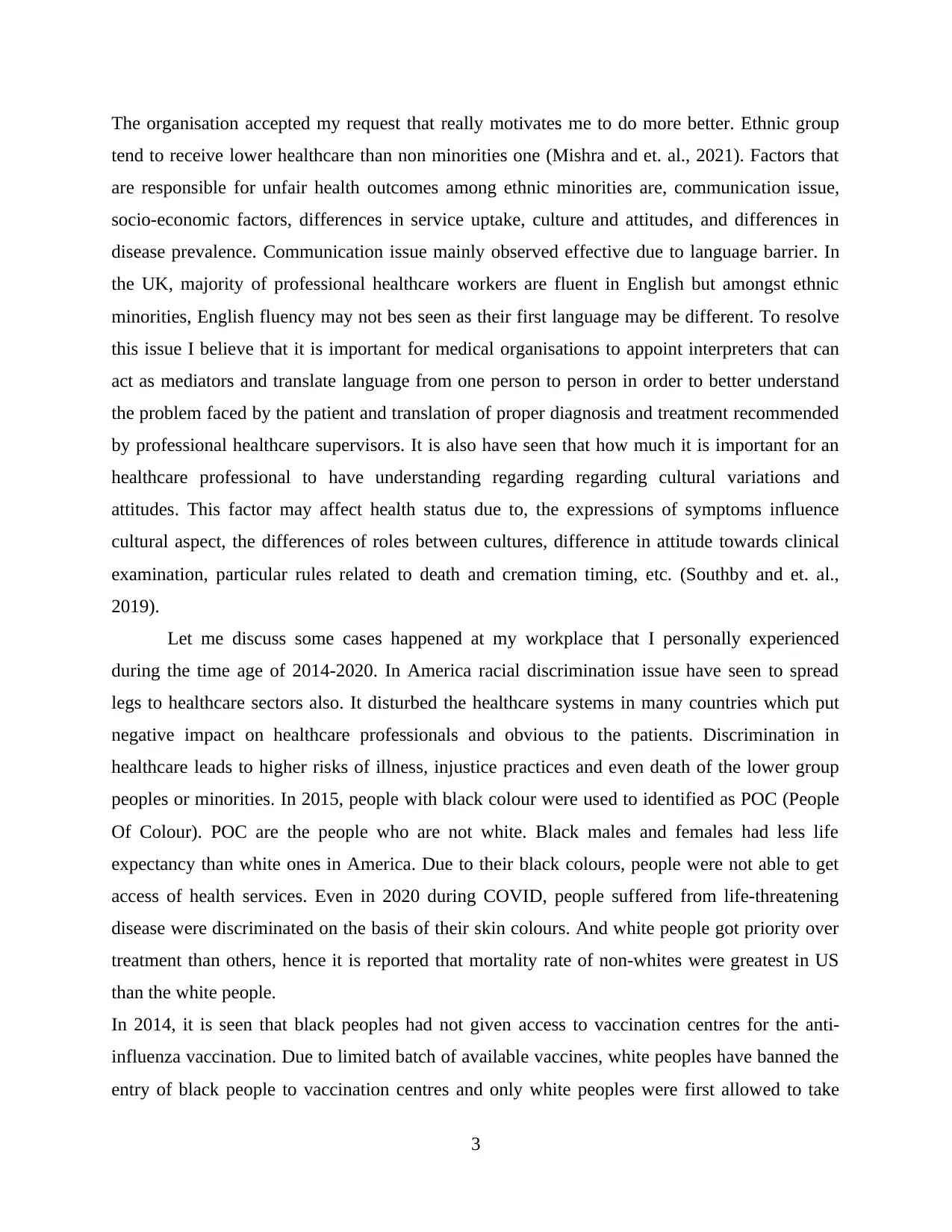
The organisation accepted my request that really motivates me to do more better. Ethnic group
tend to receive lower healthcare than non minorities one (Mishra and et. al., 2021). Factors that
are responsible for unfair health outcomes among ethnic minorities are, communication issue,
socio-economic factors, differences in service uptake, culture and attitudes, and differences in
disease prevalence. Communication issue mainly observed effective due to language barrier. In
the UK, majority of professional healthcare workers are fluent in English but amongst ethnic
minorities, English fluency may not bes seen as their first language may be different. To resolve
this issue I believe that it is important for medical organisations to appoint interpreters that can
act as mediators and translate language from one person to person in order to better understand
the problem faced by the patient and translation of proper diagnosis and treatment recommended
by professional healthcare supervisors. It is also have seen that how much it is important for an
healthcare professional to have understanding regarding regarding cultural variations and
attitudes. This factor may affect health status due to, the expressions of symptoms influence
cultural aspect, the differences of roles between cultures, difference in attitude towards clinical
examination, particular rules related to death and cremation timing, etc. (Southby and et. al.,
2019).
Let me discuss some cases happened at my workplace that I personally experienced
during the time age of 2014-2020. In America racial discrimination issue have seen to spread
legs to healthcare sectors also. It disturbed the healthcare systems in many countries which put
negative impact on healthcare professionals and obvious to the patients. Discrimination in
healthcare leads to higher risks of illness, injustice practices and even death of the lower group
peoples or minorities. In 2015, people with black colour were used to identified as POC (People
Of Colour). POC are the people who are not white. Black males and females had less life
expectancy than white ones in America. Due to their black colours, people were not able to get
access of health services. Even in 2020 during COVID, people suffered from life-threatening
disease were discriminated on the basis of their skin colours. And white people got priority over
treatment than others, hence it is reported that mortality rate of non-whites were greatest in US
than the white people.
In 2014, it is seen that black peoples had not given access to vaccination centres for the anti-
influenza vaccination. Due to limited batch of available vaccines, white peoples have banned the
entry of black people to vaccination centres and only white peoples were first allowed to take
3
tend to receive lower healthcare than non minorities one (Mishra and et. al., 2021). Factors that
are responsible for unfair health outcomes among ethnic minorities are, communication issue,
socio-economic factors, differences in service uptake, culture and attitudes, and differences in
disease prevalence. Communication issue mainly observed effective due to language barrier. In
the UK, majority of professional healthcare workers are fluent in English but amongst ethnic
minorities, English fluency may not bes seen as their first language may be different. To resolve
this issue I believe that it is important for medical organisations to appoint interpreters that can
act as mediators and translate language from one person to person in order to better understand
the problem faced by the patient and translation of proper diagnosis and treatment recommended
by professional healthcare supervisors. It is also have seen that how much it is important for an
healthcare professional to have understanding regarding regarding cultural variations and
attitudes. This factor may affect health status due to, the expressions of symptoms influence
cultural aspect, the differences of roles between cultures, difference in attitude towards clinical
examination, particular rules related to death and cremation timing, etc. (Southby and et. al.,
2019).
Let me discuss some cases happened at my workplace that I personally experienced
during the time age of 2014-2020. In America racial discrimination issue have seen to spread
legs to healthcare sectors also. It disturbed the healthcare systems in many countries which put
negative impact on healthcare professionals and obvious to the patients. Discrimination in
healthcare leads to higher risks of illness, injustice practices and even death of the lower group
peoples or minorities. In 2015, people with black colour were used to identified as POC (People
Of Colour). POC are the people who are not white. Black males and females had less life
expectancy than white ones in America. Due to their black colours, people were not able to get
access of health services. Even in 2020 during COVID, people suffered from life-threatening
disease were discriminated on the basis of their skin colours. And white people got priority over
treatment than others, hence it is reported that mortality rate of non-whites were greatest in US
than the white people.
In 2014, it is seen that black peoples had not given access to vaccination centres for the anti-
influenza vaccination. Due to limited batch of available vaccines, white peoples have banned the
entry of black people to vaccination centres and only white peoples were first allowed to take
3
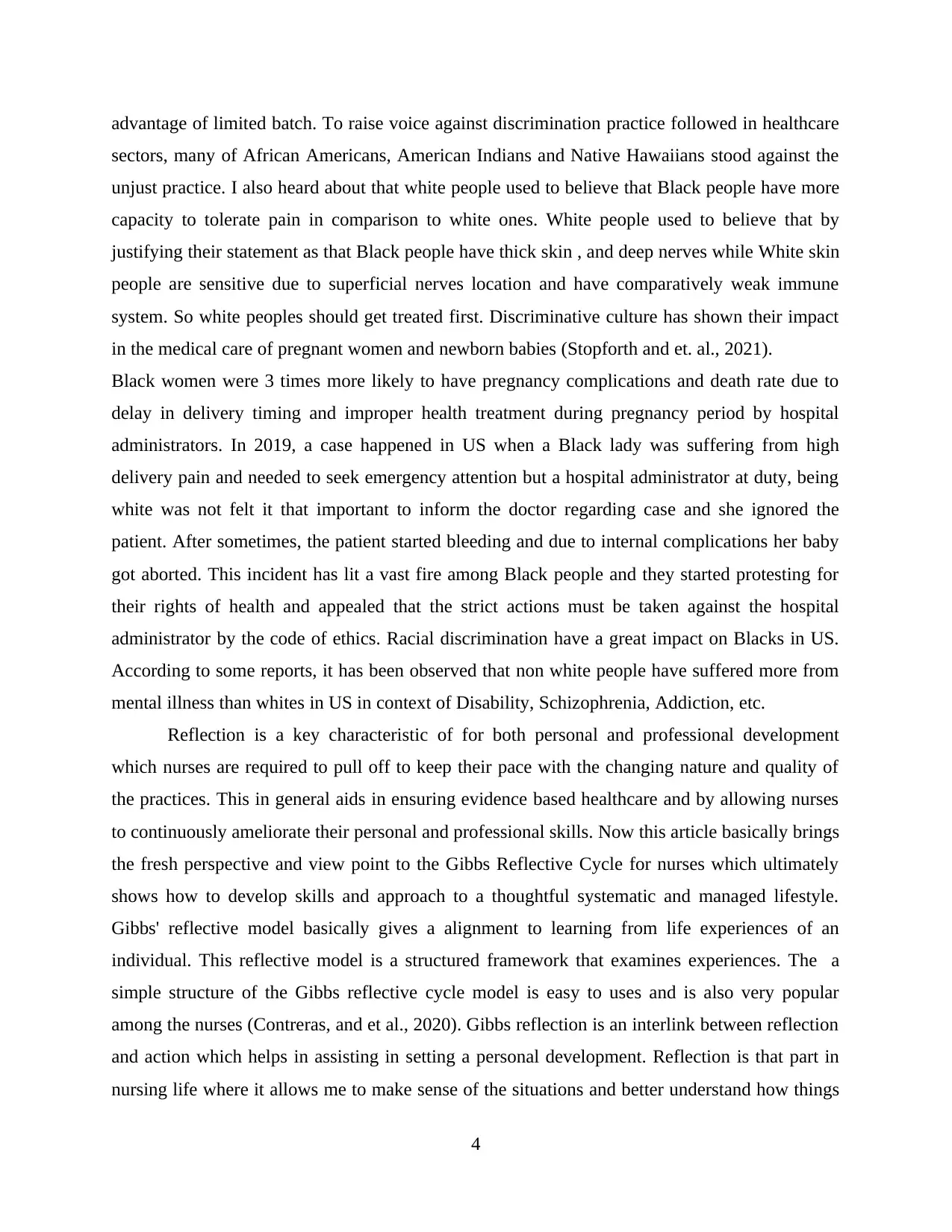
advantage of limited batch. To raise voice against discrimination practice followed in healthcare
sectors, many of African Americans, American Indians and Native Hawaiians stood against the
unjust practice. I also heard about that white people used to believe that Black people have more
capacity to tolerate pain in comparison to white ones. White people used to believe that by
justifying their statement as that Black people have thick skin , and deep nerves while White skin
people are sensitive due to superficial nerves location and have comparatively weak immune
system. So white peoples should get treated first. Discriminative culture has shown their impact
in the medical care of pregnant women and newborn babies (Stopforth and et. al., 2021).
Black women were 3 times more likely to have pregnancy complications and death rate due to
delay in delivery timing and improper health treatment during pregnancy period by hospital
administrators. In 2019, a case happened in US when a Black lady was suffering from high
delivery pain and needed to seek emergency attention but a hospital administrator at duty, being
white was not felt it that important to inform the doctor regarding case and she ignored the
patient. After sometimes, the patient started bleeding and due to internal complications her baby
got aborted. This incident has lit a vast fire among Black people and they started protesting for
their rights of health and appealed that the strict actions must be taken against the hospital
administrator by the code of ethics. Racial discrimination have a great impact on Blacks in US.
According to some reports, it has been observed that non white people have suffered more from
mental illness than whites in US in context of Disability, Schizophrenia, Addiction, etc.
Reflection is a key characteristic of for both personal and professional development
which nurses are required to pull off to keep their pace with the changing nature and quality of
the practices. This in general aids in ensuring evidence based healthcare and by allowing nurses
to continuously ameliorate their personal and professional skills. Now this article basically brings
the fresh perspective and view point to the Gibbs Reflective Cycle for nurses which ultimately
shows how to develop skills and approach to a thoughtful systematic and managed lifestyle.
Gibbs' reflective model basically gives a alignment to learning from life experiences of an
individual. This reflective model is a structured framework that examines experiences. The a
simple structure of the Gibbs reflective cycle model is easy to uses and is also very popular
among the nurses (Contreras, and et al., 2020). Gibbs reflection is an interlink between reflection
and action which helps in assisting in setting a personal development. Reflection is that part in
nursing life where it allows me to make sense of the situations and better understand how things
4
sectors, many of African Americans, American Indians and Native Hawaiians stood against the
unjust practice. I also heard about that white people used to believe that Black people have more
capacity to tolerate pain in comparison to white ones. White people used to believe that by
justifying their statement as that Black people have thick skin , and deep nerves while White skin
people are sensitive due to superficial nerves location and have comparatively weak immune
system. So white peoples should get treated first. Discriminative culture has shown their impact
in the medical care of pregnant women and newborn babies (Stopforth and et. al., 2021).
Black women were 3 times more likely to have pregnancy complications and death rate due to
delay in delivery timing and improper health treatment during pregnancy period by hospital
administrators. In 2019, a case happened in US when a Black lady was suffering from high
delivery pain and needed to seek emergency attention but a hospital administrator at duty, being
white was not felt it that important to inform the doctor regarding case and she ignored the
patient. After sometimes, the patient started bleeding and due to internal complications her baby
got aborted. This incident has lit a vast fire among Black people and they started protesting for
their rights of health and appealed that the strict actions must be taken against the hospital
administrator by the code of ethics. Racial discrimination have a great impact on Blacks in US.
According to some reports, it has been observed that non white people have suffered more from
mental illness than whites in US in context of Disability, Schizophrenia, Addiction, etc.
Reflection is a key characteristic of for both personal and professional development
which nurses are required to pull off to keep their pace with the changing nature and quality of
the practices. This in general aids in ensuring evidence based healthcare and by allowing nurses
to continuously ameliorate their personal and professional skills. Now this article basically brings
the fresh perspective and view point to the Gibbs Reflective Cycle for nurses which ultimately
shows how to develop skills and approach to a thoughtful systematic and managed lifestyle.
Gibbs' reflective model basically gives a alignment to learning from life experiences of an
individual. This reflective model is a structured framework that examines experiences. The a
simple structure of the Gibbs reflective cycle model is easy to uses and is also very popular
among the nurses (Contreras, and et al., 2020). Gibbs reflection is an interlink between reflection
and action which helps in assisting in setting a personal development. Reflection is that part in
nursing life where it allows me to make sense of the situations and better understand how things
4
⊘ This is a preview!⊘
Do you want full access?
Subscribe today to unlock all pages.

Trusted by 1+ million students worldwide
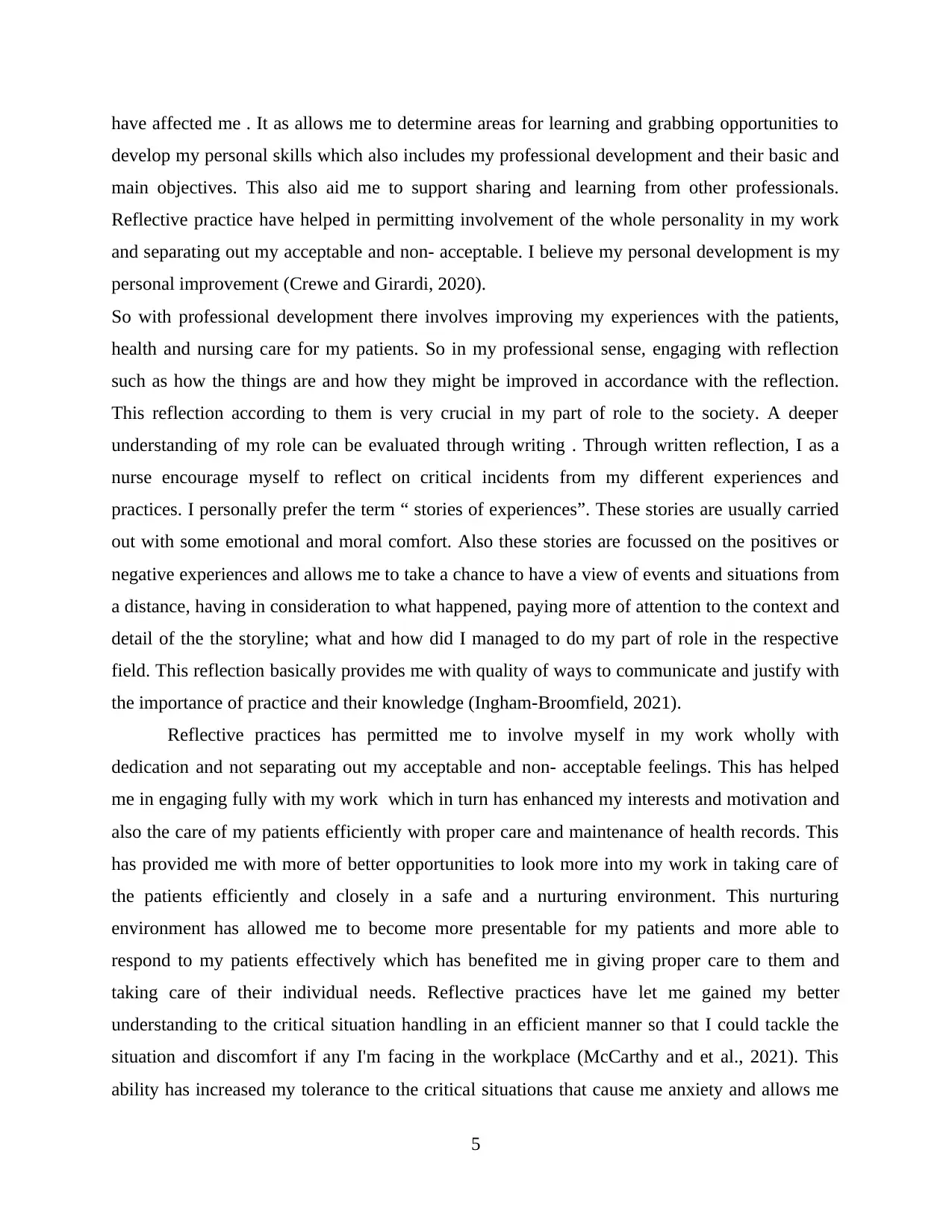
have affected me . It as allows me to determine areas for learning and grabbing opportunities to
develop my personal skills which also includes my professional development and their basic and
main objectives. This also aid me to support sharing and learning from other professionals.
Reflective practice have helped in permitting involvement of the whole personality in my work
and separating out my acceptable and non- acceptable. I believe my personal development is my
personal improvement (Crewe and Girardi, 2020).
So with professional development there involves improving my experiences with the patients,
health and nursing care for my patients. So in my professional sense, engaging with reflection
such as how the things are and how they might be improved in accordance with the reflection.
This reflection according to them is very crucial in my part of role to the society. A deeper
understanding of my role can be evaluated through writing . Through written reflection, I as a
nurse encourage myself to reflect on critical incidents from my different experiences and
practices. I personally prefer the term “ stories of experiences”. These stories are usually carried
out with some emotional and moral comfort. Also these stories are focussed on the positives or
negative experiences and allows me to take a chance to have a view of events and situations from
a distance, having in consideration to what happened, paying more of attention to the context and
detail of the the storyline; what and how did I managed to do my part of role in the respective
field. This reflection basically provides me with quality of ways to communicate and justify with
the importance of practice and their knowledge (Ingham-Broomfield, 2021).
Reflective practices has permitted me to involve myself in my work wholly with
dedication and not separating out my acceptable and non- acceptable feelings. This has helped
me in engaging fully with my work which in turn has enhanced my interests and motivation and
also the care of my patients efficiently with proper care and maintenance of health records. This
has provided me with more of better opportunities to look more into my work in taking care of
the patients efficiently and closely in a safe and a nurturing environment. This nurturing
environment has allowed me to become more presentable for my patients and more able to
respond to my patients effectively which has benefited me in giving proper care to them and
taking care of their individual needs. Reflective practices have let me gained my better
understanding to the critical situation handling in an efficient manner so that I could tackle the
situation and discomfort if any I'm facing in the workplace (McCarthy and et al., 2021). This
ability has increased my tolerance to the critical situations that cause me anxiety and allows me
5
develop my personal skills which also includes my professional development and their basic and
main objectives. This also aid me to support sharing and learning from other professionals.
Reflective practice have helped in permitting involvement of the whole personality in my work
and separating out my acceptable and non- acceptable. I believe my personal development is my
personal improvement (Crewe and Girardi, 2020).
So with professional development there involves improving my experiences with the patients,
health and nursing care for my patients. So in my professional sense, engaging with reflection
such as how the things are and how they might be improved in accordance with the reflection.
This reflection according to them is very crucial in my part of role to the society. A deeper
understanding of my role can be evaluated through writing . Through written reflection, I as a
nurse encourage myself to reflect on critical incidents from my different experiences and
practices. I personally prefer the term “ stories of experiences”. These stories are usually carried
out with some emotional and moral comfort. Also these stories are focussed on the positives or
negative experiences and allows me to take a chance to have a view of events and situations from
a distance, having in consideration to what happened, paying more of attention to the context and
detail of the the storyline; what and how did I managed to do my part of role in the respective
field. This reflection basically provides me with quality of ways to communicate and justify with
the importance of practice and their knowledge (Ingham-Broomfield, 2021).
Reflective practices has permitted me to involve myself in my work wholly with
dedication and not separating out my acceptable and non- acceptable feelings. This has helped
me in engaging fully with my work which in turn has enhanced my interests and motivation and
also the care of my patients efficiently with proper care and maintenance of health records. This
has provided me with more of better opportunities to look more into my work in taking care of
the patients efficiently and closely in a safe and a nurturing environment. This nurturing
environment has allowed me to become more presentable for my patients and more able to
respond to my patients effectively which has benefited me in giving proper care to them and
taking care of their individual needs. Reflective practices have let me gained my better
understanding to the critical situation handling in an efficient manner so that I could tackle the
situation and discomfort if any I'm facing in the workplace (McCarthy and et al., 2021). This
ability has increased my tolerance to the critical situations that cause me anxiety and allows me
5
Paraphrase This Document
Need a fresh take? Get an instant paraphrase of this document with our AI Paraphraser
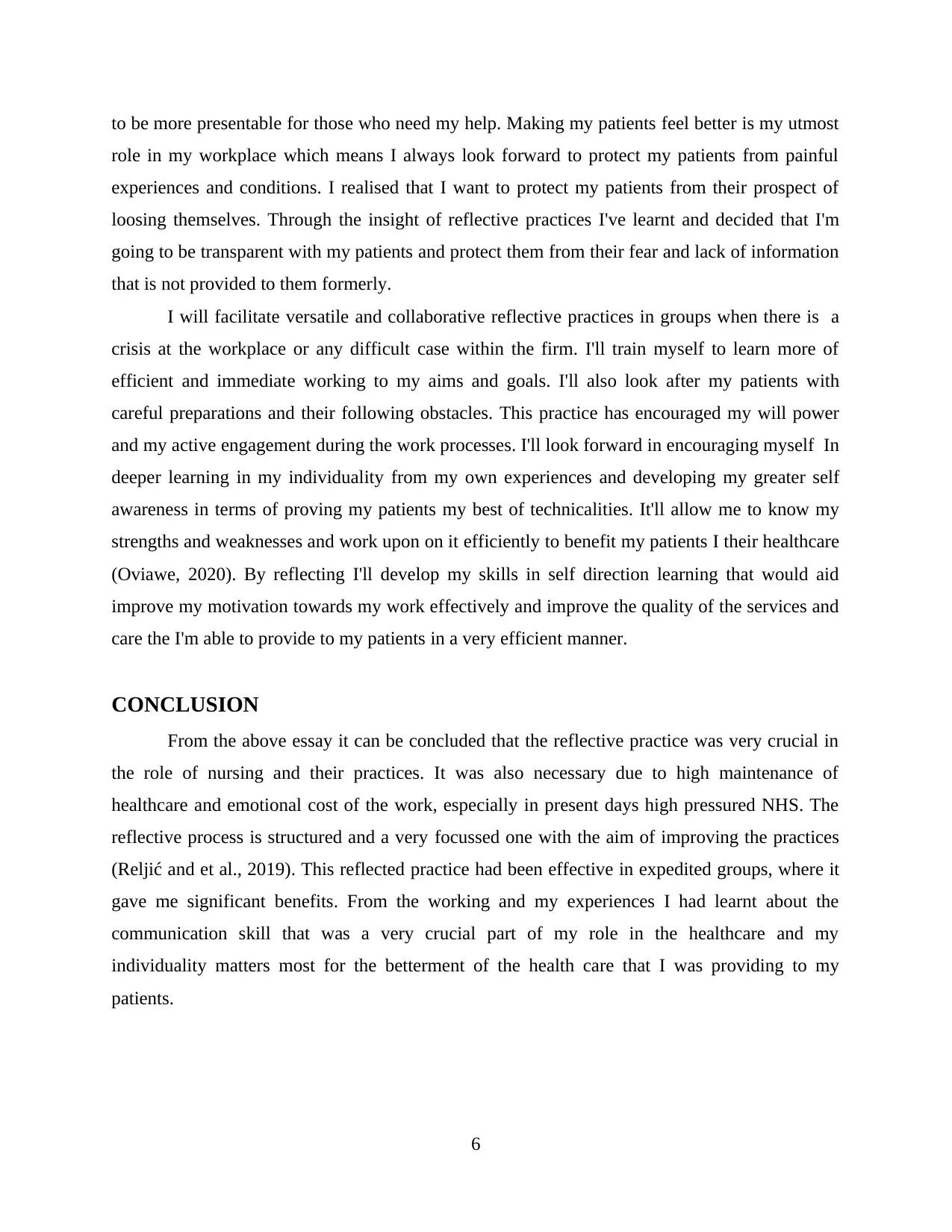
to be more presentable for those who need my help. Making my patients feel better is my utmost
role in my workplace which means I always look forward to protect my patients from painful
experiences and conditions. I realised that I want to protect my patients from their prospect of
loosing themselves. Through the insight of reflective practices I've learnt and decided that I'm
going to be transparent with my patients and protect them from their fear and lack of information
that is not provided to them formerly.
I will facilitate versatile and collaborative reflective practices in groups when there is a
crisis at the workplace or any difficult case within the firm. I'll train myself to learn more of
efficient and immediate working to my aims and goals. I'll also look after my patients with
careful preparations and their following obstacles. This practice has encouraged my will power
and my active engagement during the work processes. I'll look forward in encouraging myself In
deeper learning in my individuality from my own experiences and developing my greater self
awareness in terms of proving my patients my best of technicalities. It'll allow me to know my
strengths and weaknesses and work upon on it efficiently to benefit my patients I their healthcare
(Oviawe, 2020). By reflecting I'll develop my skills in self direction learning that would aid
improve my motivation towards my work effectively and improve the quality of the services and
care the I'm able to provide to my patients in a very efficient manner.
CONCLUSION
From the above essay it can be concluded that the reflective practice was very crucial in
the role of nursing and their practices. It was also necessary due to high maintenance of
healthcare and emotional cost of the work, especially in present days high pressured NHS. The
reflective process is structured and a very focussed one with the aim of improving the practices
(Reljić and et al., 2019). This reflected practice had been effective in expedited groups, where it
gave me significant benefits. From the working and my experiences I had learnt about the
communication skill that was a very crucial part of my role in the healthcare and my
individuality matters most for the betterment of the health care that I was providing to my
patients.
6
role in my workplace which means I always look forward to protect my patients from painful
experiences and conditions. I realised that I want to protect my patients from their prospect of
loosing themselves. Through the insight of reflective practices I've learnt and decided that I'm
going to be transparent with my patients and protect them from their fear and lack of information
that is not provided to them formerly.
I will facilitate versatile and collaborative reflective practices in groups when there is a
crisis at the workplace or any difficult case within the firm. I'll train myself to learn more of
efficient and immediate working to my aims and goals. I'll also look after my patients with
careful preparations and their following obstacles. This practice has encouraged my will power
and my active engagement during the work processes. I'll look forward in encouraging myself In
deeper learning in my individuality from my own experiences and developing my greater self
awareness in terms of proving my patients my best of technicalities. It'll allow me to know my
strengths and weaknesses and work upon on it efficiently to benefit my patients I their healthcare
(Oviawe, 2020). By reflecting I'll develop my skills in self direction learning that would aid
improve my motivation towards my work effectively and improve the quality of the services and
care the I'm able to provide to my patients in a very efficient manner.
CONCLUSION
From the above essay it can be concluded that the reflective practice was very crucial in
the role of nursing and their practices. It was also necessary due to high maintenance of
healthcare and emotional cost of the work, especially in present days high pressured NHS. The
reflective process is structured and a very focussed one with the aim of improving the practices
(Reljić and et al., 2019). This reflected practice had been effective in expedited groups, where it
gave me significant benefits. From the working and my experiences I had learnt about the
communication skill that was a very crucial part of my role in the healthcare and my
individuality matters most for the betterment of the health care that I was providing to my
patients.
6
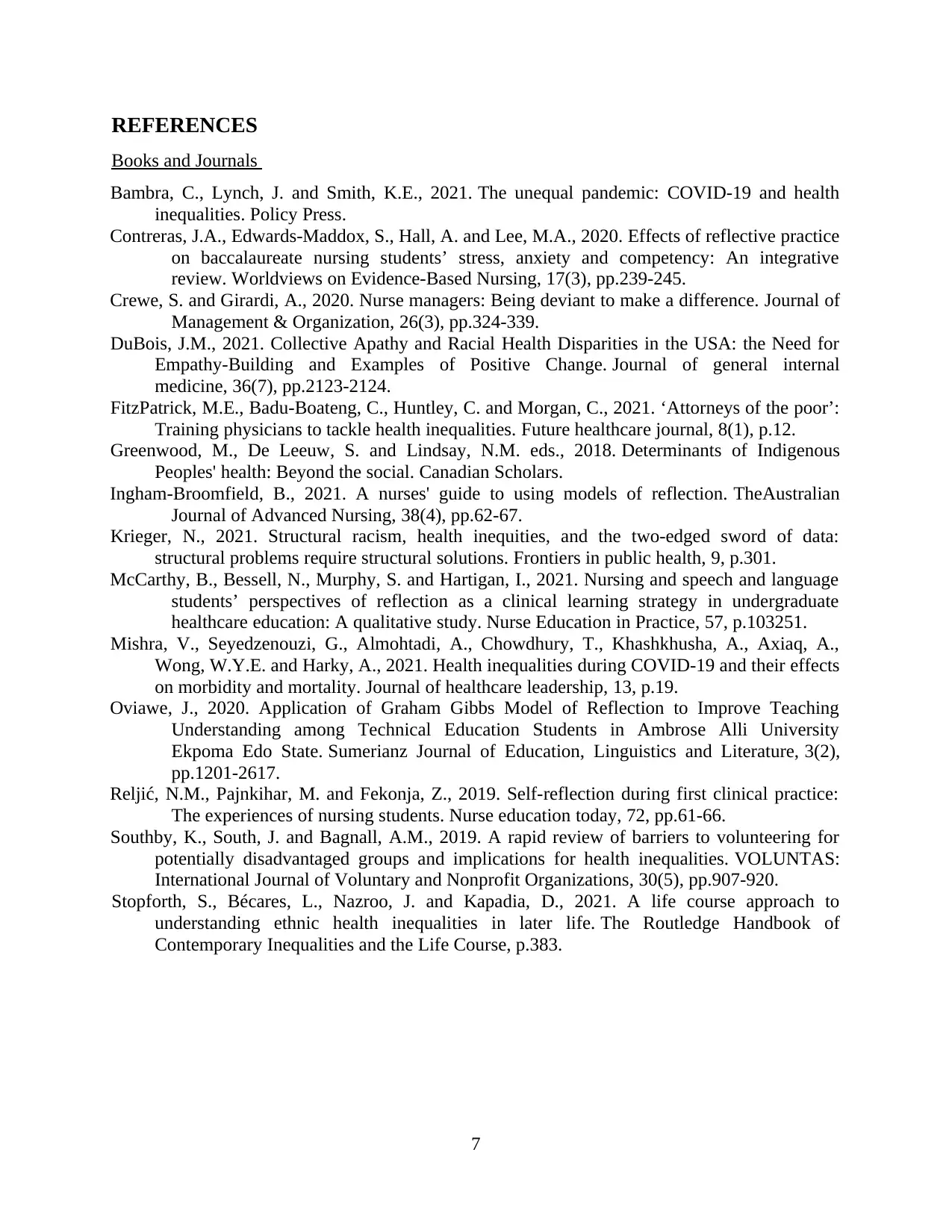
REFERENCES
Books and Journals
Bambra, C., Lynch, J. and Smith, K.E., 2021. The unequal pandemic: COVID-19 and health
inequalities. Policy Press.
Contreras, J.A., Edwards‐Maddox, S., Hall, A. and Lee, M.A., 2020. Effects of reflective practice
on baccalaureate nursing students’ stress, anxiety and competency: An integrative
review. Worldviews on Evidence‐Based Nursing, 17(3), pp.239-245.
Crewe, S. and Girardi, A., 2020. Nurse managers: Being deviant to make a difference. Journal of
Management & Organization, 26(3), pp.324-339.
DuBois, J.M., 2021. Collective Apathy and Racial Health Disparities in the USA: the Need for
Empathy-Building and Examples of Positive Change. Journal of general internal
medicine, 36(7), pp.2123-2124.
FitzPatrick, M.E., Badu-Boateng, C., Huntley, C. and Morgan, C., 2021. ‘Attorneys of the poor’:
Training physicians to tackle health inequalities. Future healthcare journal, 8(1), p.12.
Greenwood, M., De Leeuw, S. and Lindsay, N.M. eds., 2018. Determinants of Indigenous
Peoples' health: Beyond the social. Canadian Scholars.
Ingham-Broomfield, B., 2021. A nurses' guide to using models of reflection. TheAustralian
Journal of Advanced Nursing, 38(4), pp.62-67.
Krieger, N., 2021. Structural racism, health inequities, and the two-edged sword of data:
structural problems require structural solutions. Frontiers in public health, 9, p.301.
McCarthy, B., Bessell, N., Murphy, S. and Hartigan, I., 2021. Nursing and speech and language
students’ perspectives of reflection as a clinical learning strategy in undergraduate
healthcare education: A qualitative study. Nurse Education in Practice, 57, p.103251.
Mishra, V., Seyedzenouzi, G., Almohtadi, A., Chowdhury, T., Khashkhusha, A., Axiaq, A.,
Wong, W.Y.E. and Harky, A., 2021. Health inequalities during COVID-19 and their effects
on morbidity and mortality. Journal of healthcare leadership, 13, p.19.
Oviawe, J., 2020. Application of Graham Gibbs Model of Reflection to Improve Teaching
Understanding among Technical Education Students in Ambrose Alli University
Ekpoma Edo State. Sumerianz Journal of Education, Linguistics and Literature, 3(2),
pp.1201-2617.
Reljić, N.M., Pajnkihar, M. and Fekonja, Z., 2019. Self-reflection during first clinical practice:
The experiences of nursing students. Nurse education today, 72, pp.61-66.
Southby, K., South, J. and Bagnall, A.M., 2019. A rapid review of barriers to volunteering for
potentially disadvantaged groups and implications for health inequalities. VOLUNTAS:
International Journal of Voluntary and Nonprofit Organizations, 30(5), pp.907-920.
Stopforth, S., Bécares, L., Nazroo, J. and Kapadia, D., 2021. A life course approach to
understanding ethnic health inequalities in later life. The Routledge Handbook of
Contemporary Inequalities and the Life Course, p.383.
7
Books and Journals
Bambra, C., Lynch, J. and Smith, K.E., 2021. The unequal pandemic: COVID-19 and health
inequalities. Policy Press.
Contreras, J.A., Edwards‐Maddox, S., Hall, A. and Lee, M.A., 2020. Effects of reflective practice
on baccalaureate nursing students’ stress, anxiety and competency: An integrative
review. Worldviews on Evidence‐Based Nursing, 17(3), pp.239-245.
Crewe, S. and Girardi, A., 2020. Nurse managers: Being deviant to make a difference. Journal of
Management & Organization, 26(3), pp.324-339.
DuBois, J.M., 2021. Collective Apathy and Racial Health Disparities in the USA: the Need for
Empathy-Building and Examples of Positive Change. Journal of general internal
medicine, 36(7), pp.2123-2124.
FitzPatrick, M.E., Badu-Boateng, C., Huntley, C. and Morgan, C., 2021. ‘Attorneys of the poor’:
Training physicians to tackle health inequalities. Future healthcare journal, 8(1), p.12.
Greenwood, M., De Leeuw, S. and Lindsay, N.M. eds., 2018. Determinants of Indigenous
Peoples' health: Beyond the social. Canadian Scholars.
Ingham-Broomfield, B., 2021. A nurses' guide to using models of reflection. TheAustralian
Journal of Advanced Nursing, 38(4), pp.62-67.
Krieger, N., 2021. Structural racism, health inequities, and the two-edged sword of data:
structural problems require structural solutions. Frontiers in public health, 9, p.301.
McCarthy, B., Bessell, N., Murphy, S. and Hartigan, I., 2021. Nursing and speech and language
students’ perspectives of reflection as a clinical learning strategy in undergraduate
healthcare education: A qualitative study. Nurse Education in Practice, 57, p.103251.
Mishra, V., Seyedzenouzi, G., Almohtadi, A., Chowdhury, T., Khashkhusha, A., Axiaq, A.,
Wong, W.Y.E. and Harky, A., 2021. Health inequalities during COVID-19 and their effects
on morbidity and mortality. Journal of healthcare leadership, 13, p.19.
Oviawe, J., 2020. Application of Graham Gibbs Model of Reflection to Improve Teaching
Understanding among Technical Education Students in Ambrose Alli University
Ekpoma Edo State. Sumerianz Journal of Education, Linguistics and Literature, 3(2),
pp.1201-2617.
Reljić, N.M., Pajnkihar, M. and Fekonja, Z., 2019. Self-reflection during first clinical practice:
The experiences of nursing students. Nurse education today, 72, pp.61-66.
Southby, K., South, J. and Bagnall, A.M., 2019. A rapid review of barriers to volunteering for
potentially disadvantaged groups and implications for health inequalities. VOLUNTAS:
International Journal of Voluntary and Nonprofit Organizations, 30(5), pp.907-920.
Stopforth, S., Bécares, L., Nazroo, J. and Kapadia, D., 2021. A life course approach to
understanding ethnic health inequalities in later life. The Routledge Handbook of
Contemporary Inequalities and the Life Course, p.383.
7
⊘ This is a preview!⊘
Do you want full access?
Subscribe today to unlock all pages.

Trusted by 1+ million students worldwide
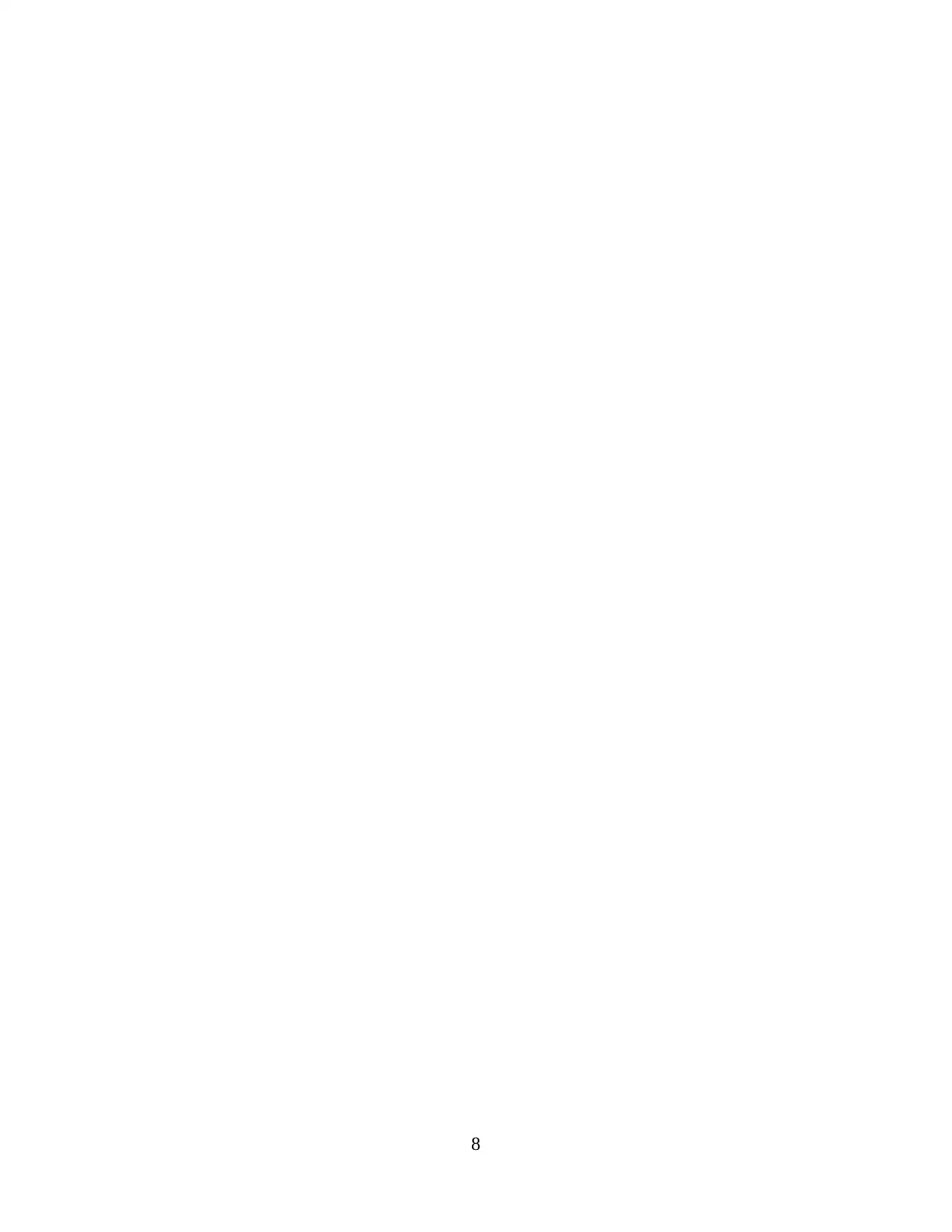
8
1 out of 10
Related Documents
Your All-in-One AI-Powered Toolkit for Academic Success.
+13062052269
info@desklib.com
Available 24*7 on WhatsApp / Email
![[object Object]](/_next/static/media/star-bottom.7253800d.svg)
Unlock your academic potential
Copyright © 2020–2026 A2Z Services. All Rights Reserved. Developed and managed by ZUCOL.





